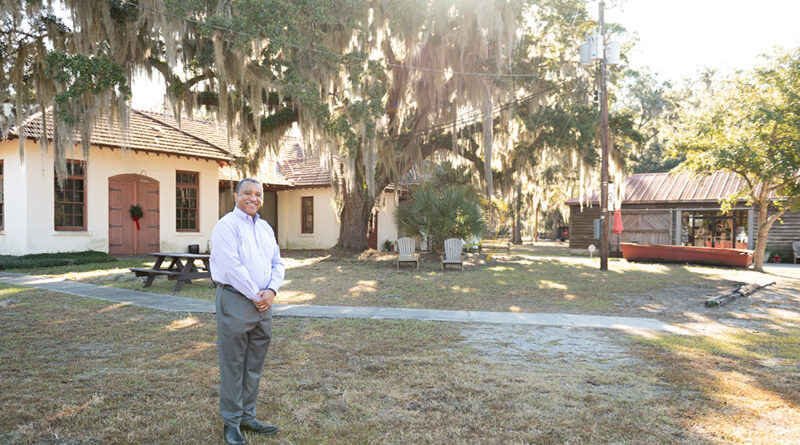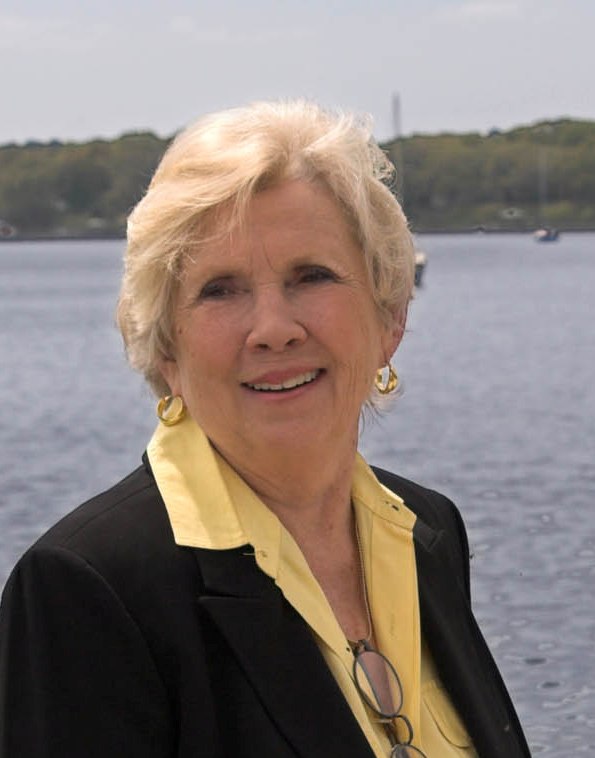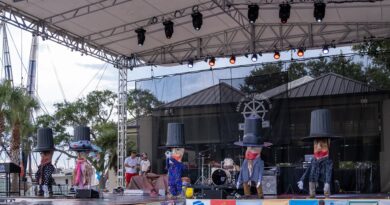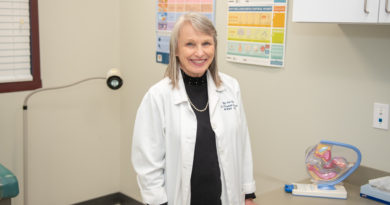DR. ROBERT ADAMS JR.
Big Shoulders to Stand on, Big Shoes to Fill
story by JENNIFER BROWN-CARPENTER photos by JENNY PHILLIPS
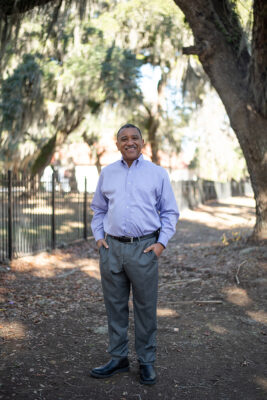 Robert Adams Jr. is a self-titled “military brat.” He grew up in several places, including Florida, Mississippi, North Carolina, Texas, and Massachusetts. Robert’s father spent 27 years in the military, which led to Robert attending ten K-12 schools from the time he started kindergarten until he graduated high school.
Robert Adams Jr. is a self-titled “military brat.” He grew up in several places, including Florida, Mississippi, North Carolina, Texas, and Massachusetts. Robert’s father spent 27 years in the military, which led to Robert attending ten K-12 schools from the time he started kindergarten until he graduated high school.
Robert was born in Bangor, Maine, where his mother’s family is from. His grandparents used to live right around the corner from prolific horror author Stephen King. The military base where Robert’s father was stationed closed shortly after Robert’s birth, causing them to relocate. Robert and his two siblings spent their childhoods mainly in the South, in mostly smaller military towns.
Robert attended the University of Texas for his undergraduate degree. He then transferred to the University of Florida for his master’s degree in sociology and returned to the University of Texas to get his doctorate in anthropology.
Regarding his career, Robert did not necessarily have a “plan” in mind. He had curiosities that drove him: he had a desire to understand history and culture, and travel the world.
The way Robert grew up, shifting from community to community, gave him this mindset. Everyone they ever lived around would proudly say they were “American,” but at the same time, they all lived uniquely different lives. From food to enunciation to the best place to find real sweet tea, the differences in cultures developed these curiosities in Robert. Going from Goldsboro, North Carolina, to spend summers in Maine was a shock of cultural differences for Robert.
Robert started taking trips to Haiti in the late 1980s as a place to learn more about the world. He learned a lot about community organizing and social change, as well as the resistance to that change and the consequences of putting yourself forward when it comes to advocacy. Haiti was a politically fraught place during that time.
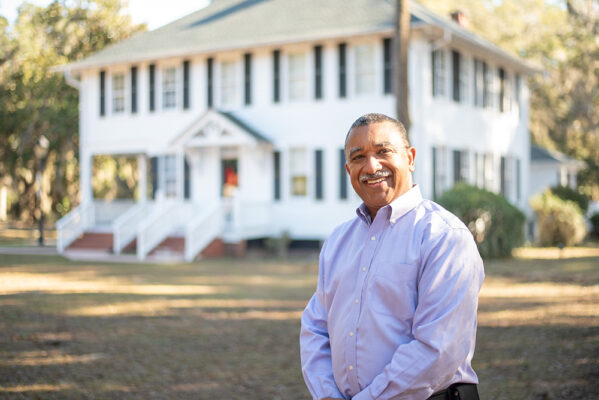
Robert got married to his late wife in Haiti in 1990. His wife was from Port-au-Prince, and her father was the mayor of a suburb of Port-au-Prince. Robert’s father-in-law was unfortunately killed due to political violence and unrest. Even that was influential to Robert. “I owe a lot to my time in Haiti, learning what is possible and about the contentious nature of change.”
Robert has worked in philanthropy, academia, and nonprofits over the years, and it has all filtered itself around the same ideas: the desire to serve people and understand more about them. Robert worked for a time at two different philanthropies: The Fetzer Institute in Kalamazoo, Michigan, and the National Education Association Foundation in Washington, D.C. Robert equates this work to teaching young people because you are making continual investments into the future while supporting the realization of dreams. Those are the types of driving factors that have allowed Robert to move his career along.
Robert worked at The King Center in Atlanta, Georgia, as an executive on loan in 2011, and that work was delightful to him. When the opportunity at Penn Center became available, Robert knew immediately that he wanted to be part of what was and is happening there. He applied on the first day that the job posting was listed. “I felt like I was called to serve here and that this is an important moment for the organization’s history and the issues that it has long been a champion of.”
If the vision of the Founding Fathers will be realized, and that means creating an inclusive democracy that will include everyone, we must continue to work and build on those initial efforts. Penn Center has been a place where that work has continuously been fostered. In the 162 years since its inception, Penn Center has been an important meeting place where the future can be discussed, including strategies that communities can use to revise and reshape American Democracy. It is a place where freedom can be explored.
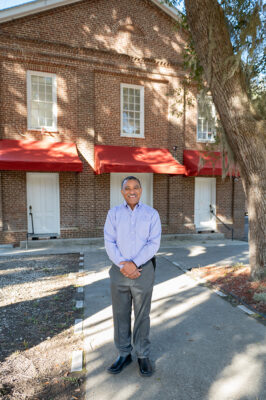 There are paradoxes in American History. The South can often be given a bad reputation when it comes to issues such as racism, segregation, etc. Robert tries to remember that those same issues are prevalent even in places like Bangor, Maine, where he was born and his grandparents live. The South has always had an important place in shaping the American Democratic experience. The South has set many political, social, and economic trends and models in our country.
There are paradoxes in American History. The South can often be given a bad reputation when it comes to issues such as racism, segregation, etc. Robert tries to remember that those same issues are prevalent even in places like Bangor, Maine, where he was born and his grandparents live. The South has always had an important place in shaping the American Democratic experience. The South has set many political, social, and economic trends and models in our country.
The South has made significant contributions to the idea of American Freedom that few places can match. We have sent legends out – Septima Clark, Jesse Jackson, and even Beaufort’s own Robert Smalls. Dr. Martin Luther King came to and returned to Penn Center because of its rich history, founded around ideas similar to those of the Civil Rights Movement, and because it was engaged in the fight for equality. The struggle was not a new one, but an ongoing one. Pat Conroy was an important white figure who spoke to this fight.
Beaufort is one of the most prepared places for continued change, according to Robert. “Our histories are more interwoven than we often allow ourselves to admit. Our backgrounds, our pasts. There are many great stories of racial cooperation, even in some of the darkest moments of our history.”
As the executive director of Penn Center, Robert is a busy man. Day-to-day, he handles the management of the campus, overseeing the current reconstruction and restoration work. Anything that is happening at Penn Center, he is involved. He greets guests who come on campus. He heads up fundraising opportunities. He serves as an ambassador for Penn Center to institutions they partner with locally and nationally. The former Governor of Massachusetts William Weld recently visited Penn Center with some of his Harvard classmates. “You never know who is going to show up. But it’s even more exciting to me when local people show up.” Robert loves it when he gets to share the area’s proud history with the people who live there, providing them with a new perspective.
Robert hopes that Penn Center continues to do more when it comes to engaging the local community. The richness of the local community is what animates Penn Center. And the Center, in return, has to be in alignment with the local community. “We want to ensure that we engage our local community while reaching the larger, national scale.”
Robert wants to continue growing the financial stability of Penn Center. “We have to be good stewards,” he says. He also wants to start focusing some of Penn Center’s efforts on providing opportunities for young people. He wants to create opportunities for workforce development and after-school programs that help young people discover who they are and what their potential is. “I want to keep them busy.”
“Young people are the future of this country. They are the future of American Democracy. We often imagine they will just magically pick up the baton. No, we must pass it to them. It must be an intentional transfer of knowledge, skills, and power.” That is how we ensure that they carry the legacy forward. St. Helena Island benefits from having a large contingent of elders on it. They are 70, 80, or even 90 years old and still actively participating in the community. It is important to ensure that the teens and young adults see their place at the table regarding the future of Penn Center and the community as a whole.
“Penn Center started as a school. We must continue that legacy even though it’s no longer a school. It has always been about giving young people the tools to live in a changing world. Penn Center is always looking back to the past to determine the future. And that is an amazing challenge.”
You can learn more about Penn Center by visiting their website, www.penncenter.com or by visiting the Center at 16 Penn Center Cir E, St. Helena Island, SC 29920.

